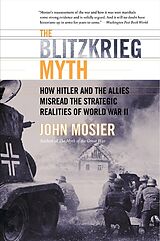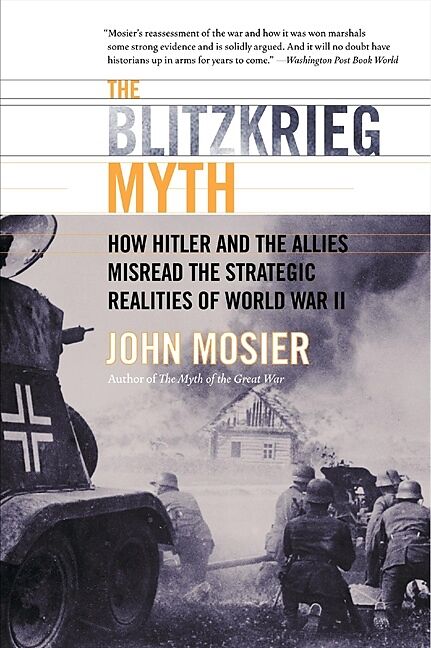The Blitzkrieg Myth
Einband:
Kartonierter Einband
EAN:
9780060009779
Untertitel:
How Hitler and the Allies Misread the Strategic Realities of World War II
Genre:
Geschichte
Autor:
John Mosier
Herausgeber:
Harper Perennial
Anzahl Seiten:
352
Erscheinungsdatum:
30.11.2004
ISBN:
978-0-06-000977-9
Many military tactics during World War II were based on the assumption that new technologies would lead to decisive battlefield victories, demoralization of the enemy by intensive bombing, or even a quick surrender. Political and military leaders, Allies and Axis alike, believed that ''blitzkrieg'' was the best way to victory. But in The Blitzkrieg Myth, John Mosier argues that this was not the case. Mosier examines the major European campaigns, including Germany''s invasion of Poland in the fall of 1939 and the fall of France in 1940, and demonstrates that they were, in fact, not blitzkrieg victories. Mosier asserts that new technologies clashed with the realities of conventional military tactics, and battle outcomes often depended on traditional warfare, in this bold reassessment of the military history of World War II. John Mosier is the author of The Myth of the Great War. He is a professor of English at Loyola University in New Orleans. His background as a military historian dates from his role in developing an interdisciplinary curriculum for the study of the two World Wars, a program funded by the National Endowment for the Humanities. From 1989 to 1992, he edited the New Orleans Review. ''Should be valued as essential reading on the great conflict.'' - Washington Times
Autorentext
John Mosier is the author of The Myth of the Great War. He is full professor of English at Loyola University in New Orleans, where, as chair of the English Department and associate dean of the College of Arts and Sciences, he taught primarily European literature and film. His background as a military historian dates from his role in developing an interdisciplinary curriculum for the study of the two world wars, a program funded by the National Endowment for the Humanities. From 1989 to 1992 he edited the New Orleans Review. He lives in Jefferson, Louisiana.
Klappentext
A bold reinterpretation of some of the most decisive battles of World War II, showing that the outcomes had less to do with popular new technology than old-fashioned, on-the-ground warfare. The military myths of World War II were based on the assumption that the new technology of the airplane and the tank would cause rapid and massive breakthroughs on the battlefield, or demoralization of the enemy by intensive bombing resulting in destruction, or surrender in a matter of weeks. The two apostles for these new theories were the Englishman J.C.F. Fuller for armoured warfare, and the Italian Emilio Drouhet for airpower. Hitler, Rommel, von Manstein, Montgomery and Patton were all seduced by the breakthrough myth or blitzkrieg as the decisive way to victory. Mosier shows how the Polish campaign in fall 1939 and the fall of France in spring 1940 were not the blitzkrieg victories as proclaimed. He also reinterprets Rommel's North African campaigns, D-Day and the Normandy campaign, Patton's attempted breakthrough into the Saar and Germany, Montgomery's flawed breakthrough at Arnhem, and Hitler's last desperate breakthrough effort to Antwerp in the Battle of the Bulge in December 1944. All of these actions saw the clash of the breakthrough theories with the realities of conventional military tactics, and Mosier's novel analysis of these campaigns, the failure of airpower, and the military leaders on both sides, is a challenging reassessment of the military history of World War II. The book includes maps and photos.

Leider konnten wir für diesen Artikel keine Preise ermitteln ...
billigbuch.ch sucht jetzt für Sie die besten Angebote ...
Die aktuellen Verkaufspreise von 6 Onlineshops werden in Realtime abgefragt.
Sie können das gewünschte Produkt anschliessend direkt beim Anbieter Ihrer Wahl bestellen.
Loading...
Die aktuellen Verkaufspreise von 6 Onlineshops werden in Realtime abgefragt.
Sie können das gewünschte Produkt anschliessend direkt beim Anbieter Ihrer Wahl bestellen.
| # | Onlineshop | Preis CHF | Versand CHF | Total CHF | ||
|---|---|---|---|---|---|---|
| 1 | Seller | 0.00 | 0.00 | 0.00 |
